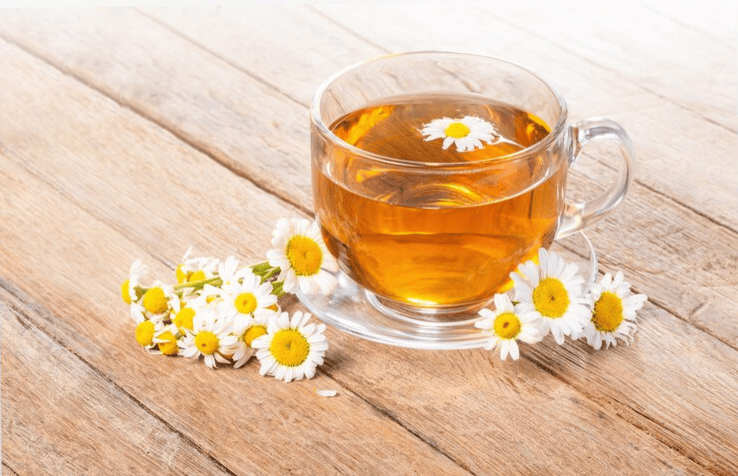Chamomile tea is a widely consumed herbal infusion often praised for its relaxing and sleep-inducing properties. But beyond its soothing reputation, is Chamomile Tea Healthy?
This caffeine-free tea is rich in antioxidants, flavonoids, and beneficial plant compounds, which may offer anti-inflammatory, digestive, and immune-boosting effects. Many people drink chamomile tea to reduce stress, improve sleep quality, and aid digestion, but does the science support these claims?
In this article, we’ll explore the true health benefits of chamomile tea, potential concerns like allergic reactions or interactions with medications, and the best ways to brew and enjoy it for maximum benefits. Whether you’re drinking it for better sleep, digestive relief, or overall wellness, understanding chamomile tea’s nutrition and effects will help you make the most of this ancient herbal remedy.
Let’s take a closer look at whether chamomile tea is truly a healthy choice and how to incorporate it into your daily routine.
Nutritional Profile of Chamomile Tea
Chamomile tea is a nutrient-rich herbal infusion made from the dried flowers of the chamomile plant. It is naturally caffeine-free and extremely low in calories, making it a great choice for those looking for a relaxing and hydrating beverage without stimulants.
Key Compounds in Chamomile Tea
Chamomile tea contains several bioactive compounds that contribute to its health benefits:
- Apigenin – A powerful antioxidant and flavonoid known for its calming and anti-inflammatory properties.
- Flavonoids – Plant-based compounds that support heart health and immune function.
- Essential Oils – Chamomile’s natural oils provide antibacterial and digestive benefits.
Nutritional Value (Per 1 Cup, 240ml)
| Nutrient | Amount |
|---|---|
| Calories | 2-5 |
| Caffeine | 0 mg |
| Flavonoids | High |
| Antioxidants | High |
Chamomile Tea vs. Other Herbal Teas
- Chamomile vs. Green Tea – Unlike green tea, chamomile does not contain caffeine or catechins, making it ideal for evening relaxation.
- Chamomile vs. Peppermint Tea – Both support digestion, but peppermint tea is more stimulating, while chamomile has a calming effect.
- Chamomile vs. Black Tea – Chamomile is caffeine-free, while black tea contains high levels of caffeine and tannins.
With its rich antioxidant profile and soothing properties, chamomile tea is a gentle, health-promoting beverage that fits well into a balanced diet.

Health Benefits of Chamomile Tea
Chamomile tea has been used for centuries as a natural remedy for various health concerns. From better sleep to improved digestion, this herbal tea offers several potential benefits.
Promotes Relaxation and Sleep
One of the most well-known benefits of chamomile tea is its calming effect. The presence of apigenin, a type of flavonoid, helps reduce anxiety and promote sleep by binding to receptors in the brain that encourage relaxation. Studies suggest that drinking chamomile tea before bed may improve sleep quality and reduce insomnia symptoms.
Supports Digestion
Chamomile tea is often used to soothe digestive discomfort, including bloating, indigestion, and nausea. Its antispasmodic properties help relax the muscles of the digestive tract, reducing cramps and discomfort. It may also support gut health by reducing inflammation in the digestive system.
Anti-Inflammatory and Immune-Boosting Properties
Chamomile tea contains antioxidants that help fight oxidative stress and inflammation in the body. Regular consumption may help strengthen the immune system, making it a great choice during cold and flu season. Additionally, its mild antibacterial effects may support oral health and help prevent infections.
With its soothing and health-promoting properties, chamomile tea is a great caffeine-free option for those looking to relax, support digestion, and enhance overall well-being.
Potential Side Effects and Concerns of Chamomile Tea
While chamomile tea offers numerous health benefits, it’s important to be aware of potential side effects and risks, especially for certain individuals.
Allergic Reactions
Chamomile belongs to the Asteraceae family, which includes ragweed, daisies, and marigolds. People with ragweed allergies may experience itching, swelling, or respiratory symptoms after drinking chamomile tea. In rare cases, severe allergic reactions (anaphylaxis) may occur. If you have seasonal allergies or a history of plant-based allergies, consult a doctor before consuming chamomile tea.
Drug Interactions
Chamomile contains natural compounds that may interact with certain medications:
- Blood Thinners (Warfarin, Aspirin): Chamomile may enhance the effects of anticoagulants, increasing the risk of bleeding or bruising.
- Sedatives & Anti-Anxiety Medications: Because chamomile has a mild sedative effect, combining it with benzodiazepines, barbiturates, or sleep aids may cause excessive drowsiness.
- Diabetes Medications: Chamomile may lower blood sugar levels, so those taking diabetes medications should monitor their levels closely.
Pregnancy Considerations
Chamomile tea is generally considered safe, but excessive consumption during pregnancy may pose risks. Some studies suggest that chamomile may stimulate uterine contractions, potentially increasing the risk of preterm labor. Pregnant women should consult their doctor before consuming chamomile regularly.
Chamomile tea is safe for most people when consumed in moderation, but individuals with allergies, certain medical conditions, or those on medication should exercise caution.
How to Drink Chamomile Tea for Maximum Benefits
Chamomile tea is a soothing herbal infusion that can be enjoyed at different times of the day for various health benefits. Here’s how to prepare and drink it for the best results.
Best Times to Drink Chamomile Tea
- Before Bedtime – Chamomile is best known for its relaxing effects, making it an excellent sleep aid. Drinking it 30 to 60 minutes before bed can help calm your nervous system and promote restful sleep.
- After Meals – Chamomile tea aids digestion by reducing bloating, gas, and indigestion. It’s particularly beneficial after a heavy meal or if you experience acid reflux.
- During Stressful Moments – Chamomile contains apigenin, a flavonoid with natural anti-anxiety properties. Sipping chamomile tea during the day can help you feel more relaxed and focused.
How to Prepare Chamomile Tea
- Loose-Leaf vs. Tea Bags – Loose-leaf chamomile tends to be fresher and more potent, but tea bags are a convenient option. If using loose-leaf tea, steep 1 to 2 teaspoons in hot water for 5 to 10 minutes.
- Water Temperature – Use hot (not boiling) water to preserve chamomile’s delicate compounds. A temperature of around 190°F (88°C) is ideal.
Enhancing Chamomile Tea with Natural Ingredients
- Honey – Adds natural sweetness and has soothing properties for the throat.
- Lemon – Provides vitamin C and enhances the tea’s antioxidant benefits.
- Ginger – Boosts digestive benefits and adds a warming effect.
- Cinnamon – Complements chamomile’s flavor while offering anti-inflammatory properties.
To maximize the benefits of chamomile tea, drink it at the right times, use high-quality tea, and enhance it with natural ingredients for added wellness benefits.

Chamomile Tea vs. Other Herbal Teas
Chamomile tea is a popular herbal infusion, but how does it compare to other teas like green tea, peppermint tea, and lavender tea? Here’s a breakdown of their benefits and best uses.
Chamomile Tea vs. Green Tea
- Best for: Relaxation and sleep
- Key Difference: Chamomile tea is naturally caffeine-free, making it ideal for nighttime relaxation, while green tea contains caffeine and is better for energy and focus.
- Health Benefits: Chamomile promotes calmness, aids digestion, and has anti-inflammatory properties, while green tea is rich in antioxidants and supports heart health and metabolism.
Chamomile Tea vs. Peppermint Tea
- Best for: Digestion
- Key Difference: Chamomile tea has mild sedative effects, whereas peppermint tea has cooling and stomach-soothing properties.
- Health Benefits: Both teas help with digestion, but peppermint tea is particularly effective in relieving bloating, gas, and nausea due to its menthol content.
Chamomile Tea vs. Lavender Tea
- Best for: Stress relief and relaxation
- Key Difference: While both teas promote relaxation, lavender tea has a stronger floral aroma and may be more effective for reducing anxiety.
- Health Benefits: Chamomile is often used for better sleep and digestion, while lavender is more associated with stress reduction and mood balance.
Which Tea Should You Choose?
- For Sleep: Chamomile or lavender tea
- For Digestion: Peppermint or chamomile tea
- For Stress Relief: Lavender tea
All these teas have unique health benefits, so the best choice depends on your specific needs.
FAQs: Is Chamomile Tea Healthy?
Does Chamomile Tea Help with Anxiety?
Yes, chamomile tea is known for its calming effects, thanks to apigenin, an antioxidant that binds to receptors in the brain to promote relaxation and reduce stress. Many people use it as a natural remedy for anxiety and mild insomnia.
Can Chamomile Tea Aid Weight Loss?
While chamomile tea does not directly burn fat, it can support weight management in several ways:
- Aids digestion, preventing bloating and discomfort.
- Promotes better sleep, which is essential for healthy metabolism.
- Reduces stress, helping to control emotional eating.
Drinking chamomile tea without added sugar as part of a balanced diet may contribute to healthy weight loss.
Is It Safe to Drink Chamomile Tea Every Day?
For most people, yes. Chamomile tea is caffeine-free and generally safe when consumed in moderation. However, those with ragweed allergies, taking blood thinners, or who are pregnant should consult a doctor before drinking it regularly.
Does Chamomile Tea Have Caffeine?
No, chamomile tea is naturally caffeine-free, making it an excellent choice for relaxation and bedtime without affecting sleep.
What Are the Best Ways to Drink Chamomile Tea?
To maximize its benefits, try:
- Before bed for better sleep.
- After meals to aid digestion.
- With honey and lemon for added flavor and immunity benefits.
- As an iced tea for a refreshing, caffeine-free drink.
Chamomile tea is a versatile and soothing beverage that can be enjoyed in various ways to support health and wellness.
Conclusion
Chamomile tea is a natural, caffeine-free beverage with numerous health benefits. Rich in antioxidants like apigenin, it is well-known for promoting relaxation, reducing stress, and improving sleep quality. Additionally, it aids digestion, reduces inflammation, and may support immune function. Its gentle, soothing properties make it a great choice for those looking to unwind or improve gut health.
However, while chamomile tea is generally safe, some individuals should exercise caution. People with ragweed allergies, those taking blood thinners or sedatives, and pregnant women should consult a healthcare provider before consuming it regularly. Drinking chamomile tea in moderation—especially before bedtime or after meals—can help you enjoy its full benefits without any adverse effects.
Whether you’re seeking better sleep, digestive relief, or a stress-reducing ritual, chamomile tea is a healthy and beneficial addition to your daily routine. Opt for organic, high-quality tea and experiment with additions like honey or lemon for extra wellness benefits.
Final verdict: Yes, chamomile tea is healthy—when consumed mindfully, it can be a soothing, beneficial part of a balanced lifestyle.


